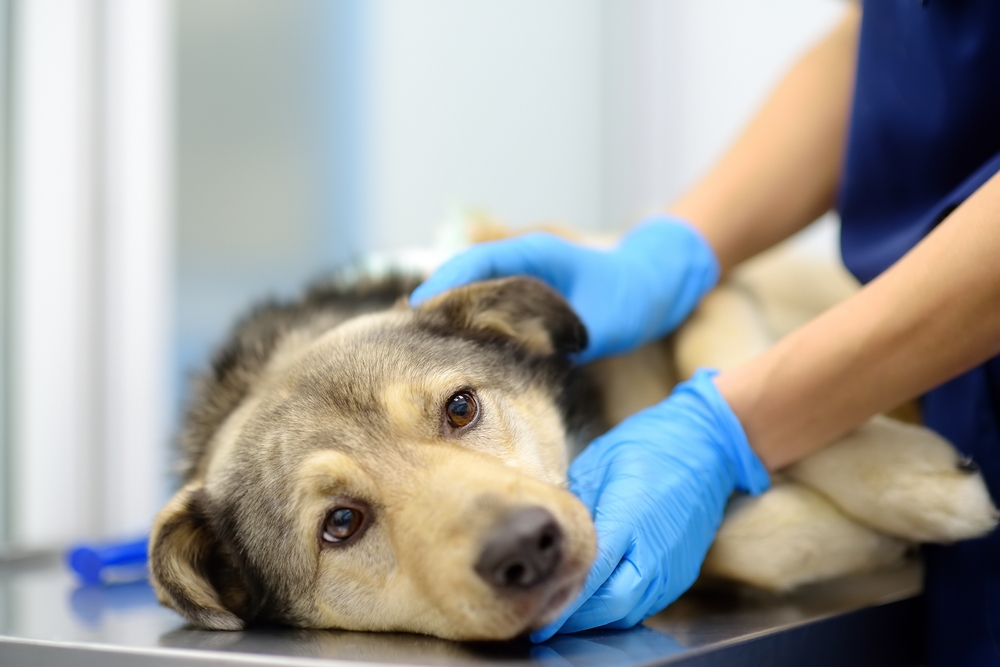Click to Skip Ahead
Xylitol is an artificial sweetener found in a large number of household foods and products. Chewing gum, toothpaste, baked goods, peanut butter…the list goes on. It is very safe for human consumption and has grown in popularity recently. Unfortunately, xylitol is extremely toxic if eaten by dogs.
Even small amounts can be lethal, having significant effects on blood sugar levels and liver function. Why is this the case? And what can be done to ensure that a dog who has eaten xylitol makes a recovery? Read on to find out!
What Is Xylitol?
Xylitol is, technically speaking, a sugar alcohol molecule, though it tastes just like regular sugar. It is derived from natural products like corn fiber and birch trees, but it is generally considered an “artificial sweetener”. It is very safe for human consumption, though it may have a mild laxative effect if eaten in excess. Its popularity in many products (edible and non-edible) has drastically risen over the past years due to its sweet flavor, low-calorie content, and ability to improve dental hygiene.
Xylitol may also be found by the names Birch Sugar, Wood Sugar, Birch Bark Extract, Sucre de Bouleau and E967 among many others.
Xylitol is found in a wide range of products now. Sugar-free chewing gum, candies, mints, and baked goods all contain xylitol. So do many toothpastes and mouthwashes, as well as some medications and vitamins. Some skin care products, sleep supplements, and digestive aids also contain xylitol.

What Is Xylitol Poisoning in Dogs?
Xylitol poisoning occurs when dogs ingest enough xylitol for it to cause toxic changes in the body. Understanding why this occurs requires a quick overview of how the body controls blood sugar levels. When we eat a meal, containing energy in the form of sugar or glucose, we get a “spike” or elevation in blood sugar levels. The brain senses this and then tells the pancreas to release insulin.
Insulin is a hormone that moves glucose out of the bloodstream and into cells, where it can be used by the body. This results in a drop in blood sugar levels, so they always remain within a normal range—not too high, not too low.
When humans eat products containing xylitol, the pancreas does not release insulin. This means that blood sugar levels remain normal, as xylitol does not really contain much sugar. In dogs, however, xylitol is absorbed into the blood extremely quickly and causes a rapid release of insulin. This drops blood sugar levels to dangerously low levels. This can occur within one hour of xylitol ingestion.
As a secondary effect, xylitol can cause irreversible liver damage, though the mechanism by which this occurs remains largely unknown.
If you’re concerned about your pet’s well-being, we recommend you contact a veterinarian.
If you need to speak with a vet but can’t get to one, head over to PangoVet. It’s an online service where you can talk to a vet online and get the personalized advice you need for your pet — all at an affordable price!
What Are the Signs of Xylitol Poisoning in Dogs?
Most signs of xylitol poisoning relate to the drop in blood sugar levels (hypoglycemia):
- Lethargy and loss of appetite
- Vomiting and diarrhea
- Weakness and collapse
- Tremors
- Seizures
Some dogs develop liver failure, and this can occur with or without hypoglycemia. The signs of liver failure include vomiting, diarrhea, lethargy, yellow discoloration of the gums, and distension of the abdomen.

How Much Xylitol is Toxic to a Dog?
The answer to this question is not straightforward, partly because the amount of xylitol varies significantly from product to product, and partly because dogs appear to have different sensitivities to the effects of xylitol.
It is generally considered that 0.075 grams per 1 kg of dog will likely cause toxicity. It is therefore recommended that you contact your veterinarian for advice if your dog has ingested any amount of xylitol.
Some brands of chewing gum contain 0.3 grams per piece of chewing gum. This is enough to cause signs of poisoning in small dogs. Again, any dog that is known to have eaten something containing xylitol should be examined by a veterinarian.
How Do I Care for a Dog with Xylitol Poisoning?
Start by contacting your vet clinic, or the nearest 24/7 emergency vet center, and arrange a consultation. The first step that may be needed is to induce emesis (make your dog vomit) to rid their stomach of the xylitol, if caught within a certain time frame. If dogs are showing signs of xylitol poisoning, or if the ingested amount is believed to be a toxic dose, hospitalization and aggressive supportive care are warranted and may continue for several days.
Many dogs require fluids via a drip, often containing glucose to ensure adequate blood sugar levels. Anticonvulsant medications may be required if your dog is tremoring or having seizures. Medications to protect the liver may be required, as well as blood transfusions.
Feeding tubes may need to be placed if your dog cannot, or will not, eat for an extended period of time. Regular blood tests are used to monitor sugar levels, liver damage, and other important parameters.
Frequently Asked Questions (FAQ)
What Is the Prognosis for Dogs with Xylitol Poisoning?
The prognosis for dogs that have ingested xylitol is fair if prompt treatment is sought. Dogs that do not receive treatment are at risk of death, and dogs that experience liver failure have a more guarded prognosis.

Is There an Antidote for Xylitol?
No, there is no antidote for xylitol. Treatment is largely supportive, meaning vets aim to counter the effects xylitol has on the body and support body function, while the toxin is being eliminated naturally.
How Can I Prevent This Problem?
There are three main steps to take to prevent xylitol poisoning:
- Ensure that any products containing xylitol are stored in a location where your dog cannot, under any circumstances, access them.
- Do not feed any xylitol-containing products to your dog. This may require you to check the product ingredients label.
- If you brush your dog’s teeth, ensure you use a dog-friendly toothpaste.
Conclusion
Xylitol ingestion is life-threatening in dogs. They may find it tempting due to its sweet flavor, but they are unaware of the serious effects it has on their body. Low blood sugar levels and liver injury require urgent veterinary care.
Follow the above steps to prevent xylitol poisoning in your dog. And if your dog has eaten xylitol, or is showing appropriate clinical signs, seek urgent veterinary attention. Earlier professional care usually leads to better health outcomes.
Featured Image Credit: Maria Sbytova, Shutterstock











